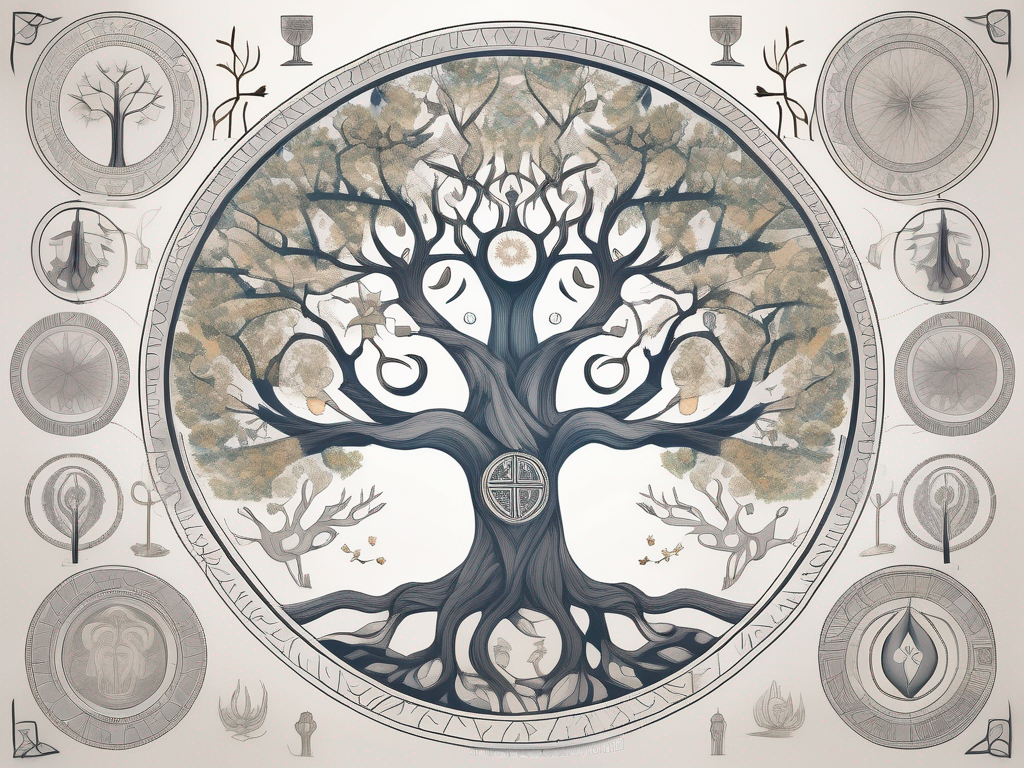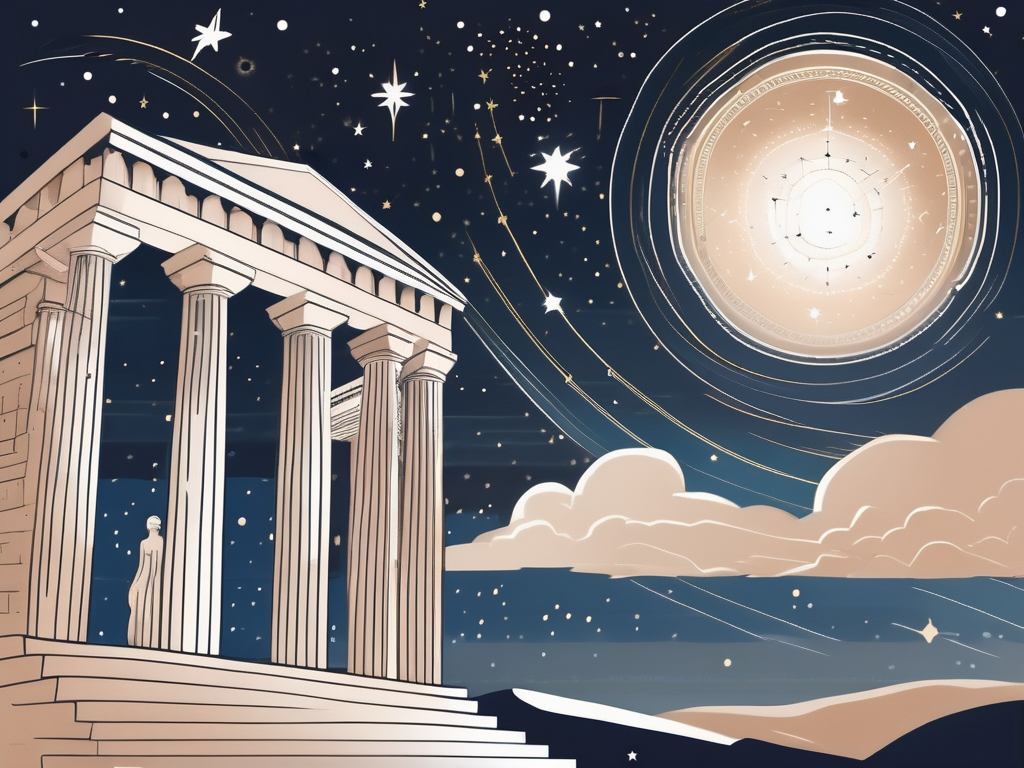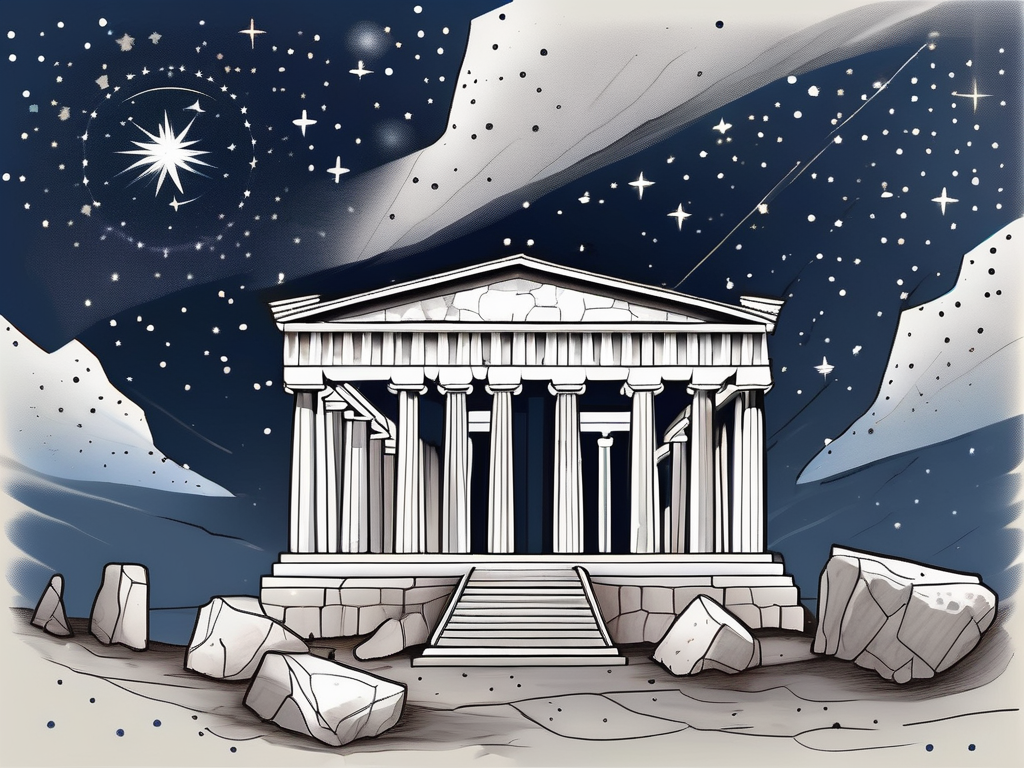The Greek pantheon is filled with powerful and fascinating deities, each with their own unique stories and legends. One such goddess who stands out among the rest is Nyx, the goddess of night. Nyx, whose name translates to “night” in Greek, holds a mythical power that intrigues and captivates all who hear her name.
Understanding the Myth of Nyx
Before we delve into the depths of Nyx’s power and influence, it is important to understand the origin of this enigmatic goddess in Greek mythology. According to the ancient Greeks, Nyx emerged from Chaos, the primordial void that existed before the creation of the universe. She is often depicted as a shadowy figure, draped in darkness and mystery.
Nyx’s origins in Chaos highlight her connection to the dark and unknown aspects of existence. She is the embodiment of the night, representing the time when the world is immersed in darkness and secrets. Her existence is intertwined with the concept of darkness and its role in the universe.
The Origin of Nyx in Greek Mythology
In Greek mythology, Nyx was believed to be one of the first beings to emerge from Chaos. She was both the mother and daughter of Erebus, the personification of darkness. This unique relationship deepened her ties to the shadowy realms she ruled over.
Nyx’s presence in Greek mythology is often closely associated with her sibling-gods, the primordial deities. These ancient beings included Uranus, the sky god, and Gaia, the earth goddess. As one of the oldest and most powerful figures in the Greek pantheon, Nyx played a significant role in the early cosmogonic myths.
Legend has it that Nyx was present at the birth of the universe, standing at the threshold between Chaos and the ordered cosmos. She watched as the first gods and goddesses emerged, shaping the world as we know it. Nyx’s influence extended beyond the physical realm, permeating the very fabric of existence.
Nyx’s Role and Influence in Ancient Greece
As the goddess of night, Nyx held immense power and influence over both mortals and gods alike. In ancient Greece, her presence was felt during the nocturnal hours, when the world was enveloped in darkness and silence. Her realm extended beyond the physical darkness, encompassing the dreams and nightmares that visited people as they slept.
Nyx’s role as the mother of numerous deities further solidified her importance in Greek mythology. She gave birth to many powerful figures, including Hypnos (Sleep), Thanatos (Death), and Nemesis (Retribution). These offspring embodied the various aspects of the night and its mysteries.
It is said that Nyx had a complex relationship with Zeus, the king of the gods. While Zeus was the ruler of the day, Nyx held sway over the night. Their interactions were often marked by a delicate balance of power, as each respected the other’s domain. Together, they ensured the harmony between light and darkness, day and night.
Throughout ancient Greece, Nyx was revered and feared. She was both a source of comfort and terror, embodying the duality of the night. People sought her protection during the darkness, praying for peaceful dreams and a safe passage through the night. At the same time, they were cautious not to invoke her wrath, for Nyx had the power to unleash chaos and nightmares upon those who crossed her.
Even today, Nyx’s influence can be felt in various aspects of our lives. The night continues to hold a certain allure, captivating our imaginations and inspiring countless stories and legends. Nyx’s legacy lives on, reminding us of the power and mysteries that lie in the darkness.
Nyx’s Family and Relationships
While Nyx’s own origins are complex and intertwined with the primordial forces of the universe, her family ties provide further insight into her character and abilities.
Delving deeper into Nyx’s family tree reveals a rich tapestry of relationships that shaped the Greek mythological landscape. From her offspring to her siblings and her interactions with other gods, Nyx’s connections were as intricate as the night sky itself.
Nyx’s Offspring and Their Roles
Nyx’s children played significant roles in Greek mythology, each representing different facets of the night. Hypnos, her son and the personification of sleep, had the power to bring rest and dreams to both gods and mortals. Imagine the peaceful slumber he bestowed upon weary travelers and the vivid dreams that danced in their minds.
Thanatos, another son of Nyx, personified death and ensured the natural cycle of life and mortality. His presence was both feared and respected, for he held the delicate balance between life and the eternal sleep that awaited all beings.
Nemesis, Nyx’s daughter, enforced retribution and justice, making sure that those who committed hubris faced appropriate consequences. Her unwavering pursuit of justice brought equilibrium to a world often plagued by arrogance and imbalance.
Nyx and Her Siblings: The Primordial Deities
As mentioned earlier, Nyx was closely associated with her siblings, the primordial deities. These entities, including Uranus and Gaia, represented fundamental aspects of the cosmos. Uranus, the personification of the sky, and Gaia, the embodiment of the earth, were Nyx’s constant companions in the vast expanse of the universe.
Nyx’s connection with her siblings emphasized the importance of darkness and night in the grand tapestry of existence. Just as the day cannot exist without the night, the primordial deities worked in harmony to maintain cosmic order.
Furthermore, in Greek mythology, Nyx’s relationship with Erebus, her father and son, is also significant. Their intertwining connection highlights the duality and complexity of Nyx’s power. As the personification of both darkness and night, Nyx had a profound influence on the world around her. Erebus, representing primordial darkness, added another layer of depth to Nyx’s enigmatic nature.
Nyx’s Relationship with Other Greek Gods
As one of the primordial deities, Nyx was respected and feared by her fellow gods. Her domain over night and darkness granted her a unique presence among the Olympians. Even Zeus, the king of the gods, acknowledged her power and authority.
In Greek literature, Nyx is often portrayed as an enigmatic figure, rarely appearing in the stories of mortals or gods. Her mystique and allure added to the reverence and awe surrounding her. Despite her infrequent appearances, Nyx’s influence was felt in every corner of the Greek mythological landscape.
Imagine the gods seeking her counsel under the cover of darkness, their voices hushed in reverence for the goddess of night. Nyx’s wisdom and insight were sought after, for she held the secrets of the universe within her shadowy realm.
In conclusion, Nyx’s family and relationships provide a glimpse into the intricate web of Greek mythology. Her offspring embodied the essence of the night, her siblings represented the primordial forces of the cosmos, and her interactions with other gods showcased her power and influence. Nyx, the enigmatic goddess of darkness and night, left an indelible mark on the mythological tapestry of ancient Greece.
The Power and Abilities of Nyx
As the goddess of night, Nyx possessed a wide array of powers and abilities that made her a force to be reckoned with in the realm of the gods.
The Domains and Aspects Controlled by Nyx
One of Nyx’s most notable powers was her control over the night itself. She could manipulate the darkness, shrouding the world in an impenetrable veil. Her influence over the nocturnal realm extended to dreams and prophecies, as she held sway over the visions that visited mortals as they slumbered.
Nyx’s control over the night also granted her the ability to cloak her presence and move unseen. This stealth and secrecy added to her enigmatic nature, making her a goddess of mystery and intrigue.
Nyx’s Influence Over Night and Darkness
As the goddess of night, Nyx personified the beauty and power that accompanied the darkness. The ancient Greeks believed that Nyx held the key to the secrets and knowledge hidden within the shadows. Her connection to darkness made her a symbol of the hidden truths that lie just beyond our understanding.
Furthermore, Nyx’s influence over darkness extended to the fears and anxieties that haunt us during the night. The Greeks believed that Nyx commanded the respect and fear of even the mightiest of gods, reminding them of their mortality in the face of the unknown.
The Fear and Respect Nyx Commanded Among Gods
Nyx’s power and authority were held in high regard among both mortals and gods. Even Zeus, the ruler of Mount Olympus, recognized her influence and treated her with reverence and deference. Nyx’s status as a primordial deity made her a force to be reckoned with, even among the mighty Olympians.
Nyx in Literature and Art
Throughout history, Nyx’s presence and power have captured the imagination of artists and writers, resulting in numerous depictions in ancient Greek literature and art.
Depictions of Nyx in Ancient Greek Literature
In ancient Greek literature, Nyx was often portrayed as an elusive and mysterious figure. Her sparse appearances in myths and legends added to her allure and enigma. Writers would often reference her in passing, emphasizing her place among the most ancient and enduring deities.
Despite her infrequent presence in Greek literature, Nyx’s impact on the stories of other gods and mortals was undeniable. Her role as the mother of powerful offspring further elevated her status in the pantheon of Greek mythology.
Nyx’s Representation in Greek and Roman Art
Nyx’s powerful image has left an indelible mark on ancient Greek and Roman art. In many artistic depictions, she is shown as a shadowy figure, draped in darkness and mystery. Her ethereal beauty and commanding presence are evident in the intricate sculptures and elaborate paintings that have survived through the centuries.
Artists often took great care to capture the essence of night and darkness in their representations of Nyx. Whether through subtle use of colors or intricate details, these works of art are a testament to the lasting impact and allure of the goddess of night.
The Enduring Power of Nyx
In conclusion, Nyx, the goddess of night, holds a mythical power that continues to captivate and intrigue audiences to this day. Her influence on Greek mythology, both in the pantheon of gods and in the lives of mortals, is a testament to the enduring nature of her power. From her enigmatic origin to her relationships with other deities, Nyx’s mythical status sets her apart as a unique and awe-inspiring goddess. Her control over darkness and her ability to inspire both fear and respect further highlight her significance in ancient Greek culture. Through literature and art, Nyx’s legacy lives on, allowing us to unravel the mysteries of the night and glimpse into the power she holds.












